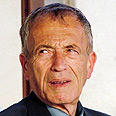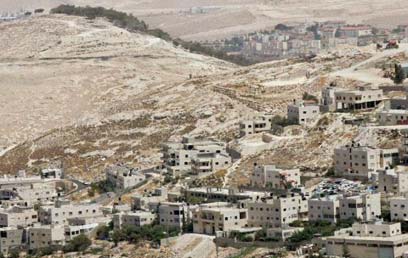
Ezra: U.S. didn't voice firm objection
צילום: אחיה ראב"ד
Ezra: U.S. didn't object to E1 construction
Bulldozers start work ahead of construction of police headquarters in disputed area connecting Jerusalem and settlement of Maale Adumim; Minister Ezra: We informed the Americans, they didn't voice firm objection
The United States did not voice firm objection to the beginning of construction work in the disputed E1 area connecting Jerusalem to the West Bank settlement of Maale Adumim, Internal Security Minister Gideon Ezra told Ynet on Monday.
Preparation work for the construction of a police station in the controversial E1 apparently got under way this week. In the past few days, bulldozers have began work in the area ahead of the construction of what is slated to become the Judea and Samaria police headquarters.

Maale Adumim
The construction project is of great significance for Israel's interests, Internal Security Minister Gideon Ezra said.
"I would like to see the entire neighborhood, encompassing thousands of housing units, completed in order to ensure contiguity between Jerusalem and Maale Adumim," he added.
According to Ezra, works began immediately after all legal objections to the project were removed. As noted above, the minister added the Americans did not voice firm opposition to the move.
"We informed the Americans in the past and they didn't show firm resistance to this matter," Ezra said. "We are building there in accordance with the State of Israel's needs," he said.
The plan to build thousands of housing unites in the E1 area aroused international criticism when it was first made public, mostly on the part of the United States. Likud Chairman Benjamin Netanyahu, who slammed the decision to freeze construction in the area due to the controversy, visited the E1 zone a day after his election as head of the party.
Determining Israel's permanent borders
Officials in Jerusalem stressed the region is part of the territorial contiguity Israel is attempting to ensure in the major settlement bloc in the West Bank, which it seeks to strengthen ahead of negotiations regarding Israel's borders in the vicinity of the capital.
However, the sources claimed that at this point the project pertains only to the construction of a police station and that the construction of 3,500 housing units in the area is not yet under way.
Israel will insist that Maale Adumim and the region connecting it with Jerusalem remain inside Israel's borders in the framework of any future agreement, one official said. He also added that any move on the matter will be undertaken in cooperation with the American Administration, but noted that at this point no such talks are necessary – as it was not yet decided to initiate mass construction in the area.
Notably, the U.S., Europe and the Palestinians object to any Israeli construction in E1. Nevertheless, Acting Prime Minister Ehud Olmert stated in media interviews over the weekend Israel plans to build in the area.
Sources at the Prime Minister's Office reported Monday that Olmert has already updated the Americans three months ago regarding Israel's intentions to build in the region in the next four years.
'Construction won't interfere with Palestinian state'
Connecting Jerusalem to nearby settlements is a "fundamental, clear interest" for Israel, Minister of Housing and Construction Ze'ev Boim said, addressing the matter.
The minister added the U.S. was unpleased with previous Israeli construction projects in disputed areas, but noted "we always built in Jerusalem, even in contrast to the position of our good friends."
"Ehud Olmert also realized that the areas in east Jerusalem should be populated. Responding to claims the Americans oppose this, Olmert repeatedly said he thought this was the right thing to do… populating Jerusalem's surroundings with Jewish settlements creates an important strategic continugity for Israel," Boim said.
According to the minister, construction in the E1 zone will not prevent any future contact between Samaria and Judea and between the Ramallah region and Hebron.
"The Palestinians would be able to use a highway system that could serve to connect north and south, such as the Jerusalem eastern bypass highway, which creates a Palestinian transportation route and is currently under construction" he explained.
"Israel will not prevent these traffic routes from allowing the Palestinians to create the necessary continugity when forming a Palestinian state," he added.
Boim said Israel and the U.S. were not in agreement over the issue, but that he believed the Americans will eventually accept Israel's stance on the matter.










